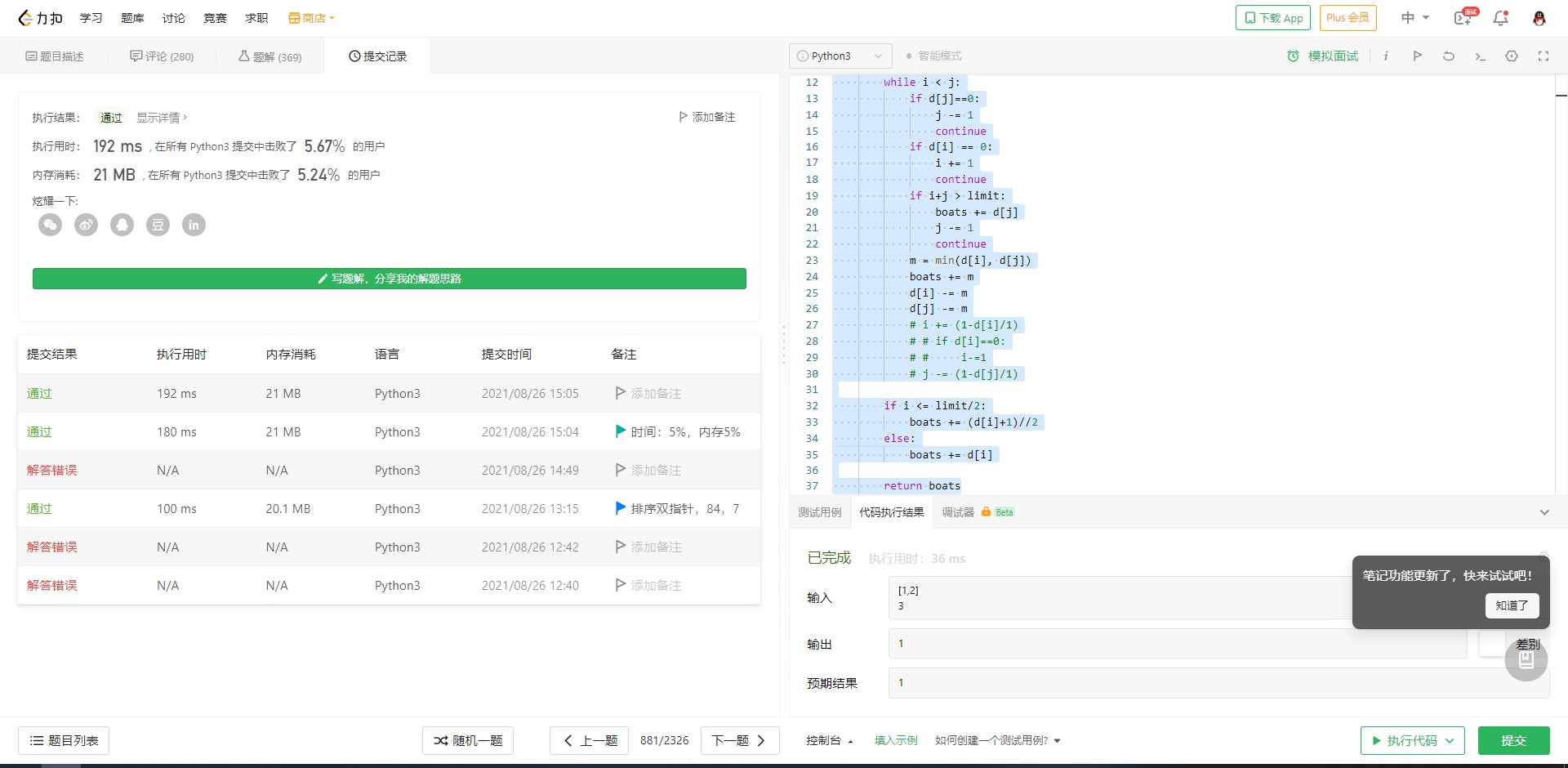题目
881. 救生艇
难度:中等
第 i 个人的体重为 people[i],每艘船可以承载的最大重量为 limit。
每艘船最多可同时载两人,但条件是这些人的重量之和最多为 limit。
返回载到每一个人所需的最小船数。(保证每个人都能被船载)。
示例 1:
输入:people = [1,2], limit = 3 输出:1 解释:1 艘船载 (1, 2)
示例 2:
输入:people = [3,2,2,1], limit = 3 输出:3 解释:3 艘船分别载 (1, 2), (2) 和 (3)
示例 3:
输入:people = [3,5,3,4], limit = 5 输出:4 解释:4 艘船分别载 (3), (3), (4), (5)
提示:
1 <= people.length <= 500001 <= people[i] <= limit <= 30000
方法一: 贪心=排序+双指针
将people数组排序之后,用双指针的方法来做。要使船的数量尽可能少,那就让一个船上的人尽可能多,也就是让体重大的,尽可能和一个体重轻的坐一个船。两个指针i和j,一个从轻往重走,一个从重往轻走,如果可以一起坐船,两个指针一起动,boats计数自增;如果两个不能一起坐船,那就重的指针移动,计数自增;直到两个指针重合,这时候,计数还需要再自增一次。
贪心相当于思想,排序+双指针是具体的实现方法。1
2
3
4
5
6
7
8
9
10
11
12
13
14
15def numRescueBoats(people, limit):
people.sort()
i, j = 0, len(people)-1
boats = 0
while i < j:
if people[i]+people[j] > limit:
j -= 1
boats+=1
else:
boats+=1
i += 1
j -= 1
if i==j:
boats+=1
return boats1
2
3
4
5
6
7
8
9
10
11
12
13
14
15
16
17
18class Solution:
def numRescueBoats(self, people: List[int], limit: int) -> int:
ans = 0
people.sort()
light, heavy = 0, len(people) - 1
while light <= heavy:
if people[light] + people[heavy] > limit:
heavy -= 1
else:
light += 1
heavy -= 1
ans += 1
return ans
作者:LeetCode-Solution
链接:https://leetcode-cn.com/problems/boats-to-save-people/solution/jiu-sheng-ting-by-leetcode-solution-0nsp/
来源:力扣(LeetCode)
著作权归作者所有。商业转载请联系作者获得授权,非商业转载请注明出处。
方法二: 贪心
这其实使我首先想到的方法,但。1
2
3
4
5
6
7
8
9
10
11
12
13
14
15
16
17
18
19
20
21
22
23
24
25
26
27
28
29
30
31
32
33
34
35
36def numRescueBoats(people, limit):
d = defaultdict(int)
i, j = limit+1, 0
for w in people:
d[w] += 1
if i > w:
i = w
if j < w:
j = w
boats = 0
while i < j:
if d[j]==0:
j -= 1
continue
if d[i] == 0:
i += 1
continue
if i+j > limit:
boats += d[j]
j -= 1
continue
m = min(d[i], d[j])
boats += m
d[i] -= m
d[j] -= m
# i += (1-d[i]/1)
# # if d[i]==0:
# # i-=1
# j -= (1-d[j]/1)
if i <= limit/2:
boats += (d[i]+1)//2
else:
boats += d[i]
return boats
说明:
这里的做法是先统计了每种体重的人数,然后再用双指针的方法根据人数来做。
每次进入循环的时候,都要先判断对应体重的人数是不是0,这是因为,如果是0而没有先做处理的话,会出现if i+j > limit:依然被执行的情况。
以为这种方法会减少时间消耗,然而并没有。


